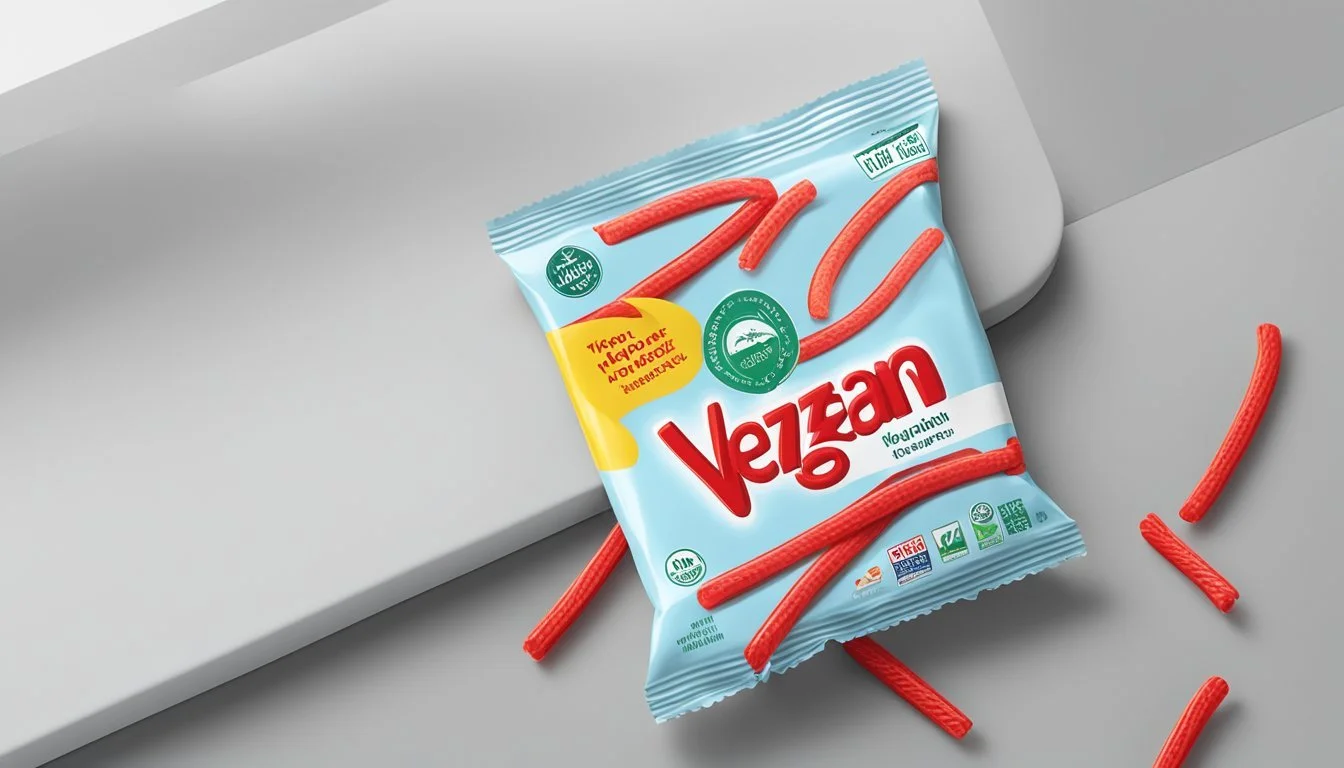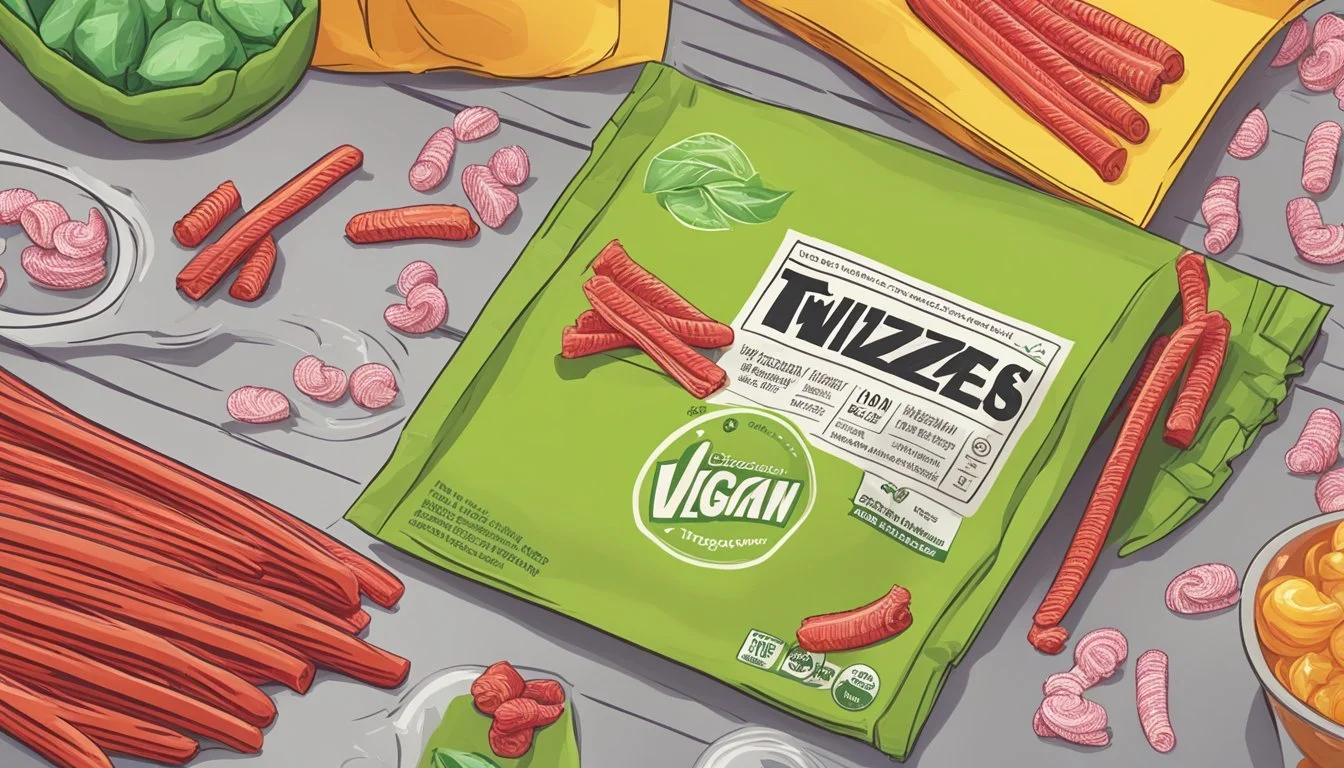Are Twizzlers Vegan?
Unwrapping the Ingredients List
Many consumers today are increasingly cautious about the ingredients in their snacks, particularly those following a vegan diet. With growing interest in animal-free food options, the question "Are Twizzlers vegan?" has become a notable topic of discussion. Twizzlers, the popular licorice candy made by The Hershey Company, are frequently scrutinized by those seeking to adhere to vegan standards.
The primary concern with Twizzlers for vegans has historically been the potential inclusion of animal-derived ingredients such as gelatin. However, it appears that Twizzlers do not contain gelatin or other ingredients directly sourced from animals, such as meat, eggs, dairy, or insect by-products. This would initially suggest that Twizzlers might be suitable for a vegan diet.
Despite the absence of these direct animal products, Twizzlers are not officially listed as vegan by The Hershey Company, which leaves room for some ambiguity. This lack of certification or vegan labeling could stem from the potential for cross-contamination with non-vegan items during the manufacturing process or the presence of derivative substances like glycerin, which can be plant-derived or animal-derived. Thus, while Twizzlers do not overtly contain animal products, strict vegans might require more transparent labeling before including Twizzlers in their diet.
Overview of Twizzlers
Twizzlers, the twisted licorice candy known for its chewy texture, comes in a plethora of flavours and varieties. It is manufactured by The Hershey Company, one of the largest chocolate manufacturers in North America.
Brand and Manufacturing
Twizzlers is a confectionery brand under the umbrella of The Hershey Company, which began producing these distinctive treats in 1845. The manufacturing process emphasizes a unique twist design, making Twizzlers a recognisable staple in candy aisles. They're particularly famous for their strawberry flavor, although other flavours like chocolate and cherry are also popular.
Product Range
The Twizzlers product range includes original red licorice twists, and extends to a variety of other options:
Strawberry Twizzlers: The classic favourite, embodying the traditional red licorice flavor.
Chocolate Twizzlers: A richer, cocoa-infused variant catering to chocolate lovers.
Black Licorice Twizzlers: For those with a taste for the bold, original licorice flavour.
Nibs and Bites: Bite-sized versions of the classic Twizzlers, available in strawberry and cherry flavors.
Filled Twists: A twist with filling for an extra flavourful experience.
Rainbow Twizzlers: A colorful assortment typically including flavors such as strawberry, orange, lemonade, watermelon, blue raspberry, and grape.
Across the diverse lineup, Twizzlers offer an iconic chewy experience with enduring popularity.
Ingredients Analysis
In the discussion of whether Twizzlers are vegan, an analysis of their ingredients is vital. This includes common components, potentially controversial additives from a vegan perspective, and the nuances surrounding sugar sourcing.
Common Ingredients
Twizzlers often contain wheat flour, corn syrup, cornstarch, sugar, and artificial flavor as their basic ingredients. The absence of gelatin, a common gelling agent derived from animals, in Twizzlers suggests they may align with a vegan diet. Besides gelatin, no other animal-derived ingredients such as dairy or eggs are found in Twizzlers, marking them as plant-based by their core components. Additionally, glycerin is used, which can be plant-based or animal-derived, but in the case of Twizzlers, it is often sourced from vegetable oils.
Controversial Additives
Twizzlers contain several additives that some vegans might find controversial:
Artificial colors like Red 40 are tested on animals and are derived from petroleum byproducts.
Palm oil is a plant-based ingredient; however, its inclusion raises ethical concerns due to the environmental impact of palm oil production.
Sugar in the United States is sometimes processed with bone char which is not vegan, although whether this affects the final product's vegan status is debated in the vegan community.
Preservatives such as potassium sorbate to maintain freshness, and soy lecithin, an emulsifier, are typically included.
Sugar Sources and Concerns
The sugar used in Twizzlers can be a sticking point. While it is plant-based, some sugar manufacturers use bone char in the refinement process, a product derived from animal bones. This practice may not align with the ethical standards of some vegans. However, Hershey, the producer of Twizzlers, does not specify whether the sugar used in Twizzlers undergoes this process. Therefore, those following a vegan lifestyle strictly for ethical reasons might scrutinize this aspect more closely.
Are Twizzlers Vegan?
Twizzlers are commonly regarded as a treat compatible with a vegan diet, as they do not contain gelatin or other readily identifiable animal-derived ingredients. However, the absence of official vegan certification makes it hard to guarantee that all components are free from animal involvement.
Vegan Status of Ingredients
Twizzlers' ingredients are predominantly plant-based, including items such as:
Corn syrup
Wheat flour
Sugar
Cornstarch
Artificial flavorings
These ingredients suggest that Twizzlers could fit within a vegan diet. The product does not list gelatin—an animal product commonly used in candies—fortifying its vegan-friendly image. However, Twizzlers do include glycerin. The manufacturer, Hershey, states that the glycerin used is derived from vegetable oils rather than animal fat.
Despite this, some vegans may have concerns with certain ingredients such as sugar, which can be processed with bone char, or palm oil, linked to environmental issues like deforestation. This complex processing raises questions for vegans who avoid all products with any kind of indirect animal involvement or environmental harm.
Vegan Certification
Twizzlers have not been officially certified as vegan. While all the listed ingredients are plant-based or synthetic, the lack of explicit vegan accreditation means those adhering to strict vegan standards may seek additional reassurances.
The absence of certification can be due to several factors such as cross-contamination risks in manufacturing facilities or the potential use of animal-derived substances in minor ingredients or processing aids. Moreover, the product is not marketed with vegan labeling nor claims to be non-GMO or kosher, which sometimes overlap with vegan preferences due to the avoidance of certain animal products, although these standards are not identical to veganism.
In conclusion, while Twizzlers are likely suitable for vegans from an ingredient perspective, the official stance on their vegan status remains unverified due to the lack of certification.
Environmental and Ethical Considerations
When examining Twizzlers' vegan status, enthusiasts must consider not only the ingredients but also the environmental and ethical implications surrounding these components. The production of certain ingredients may have significant impacts on the environment and animals.
Palm Oil and Deforestation
Twizzlers ingredients might not contain palm oil directly, but its production is often under scrutiny due to links with deforestation. Palm oil plantations have led to the loss of vast tracts of rainforest, endangering species such as the orangutan and disrupting animal habitats. Consumers concerned with the ethical impacts of their food choices consider these factors when evaluating vegan products.
Sugar Production Impact
Sugar production can have a notable environmental footprint, whether sourced from sugar beets or sugar cane. The cultivation of these crops often requires intensive farming practices that may lead to soil depletion and waterway pollution. Furthermore, beet sugar is sometimes processed using bone char from animals, which raises concerns for vegans about indirect involvement with animal byproducts.
Animal Testing and Byproducts
Beyond the ingredients contained within Twizzlers, the ethics of animal testing for food additives and colorings can be a point of consideration. While Twizzlers do not themselves contain animal byproducts, animal testing raises ethical questions for those seeking to avoid all forms of animal exploitation. They must investigate if any of the additives or colorings in Twizzlers were subject to such practices, which goes beyond ingredient composition and into the realm of corporate responsibility.
Healthy Alternatives to Twizzlers
For those seeking vegan and potentially healthier alternatives to Twizzlers, there are a variety of options available. These include brands offering licorice that maintain vegan standards, as well as recipes for crafting a homemade treat.
Vegan-friendly Licorice Brands
Red Vines: This licorice brand offers products that are free from animal derivatives, making them a vegan-friendly option. Their licorice is similar in texture and fruity flavor to Twizzlers.
YumEarth: YumEarth provides a line of organic candy that includes licorice. Their products boast being not only vegan but also gluten-free, offering a choice for those with dietary restrictions.
Panda Licorice: Panda offers a range of licorice products that are vegan. They are made from simple, non-GMO ingredients and are also available in organic varieties.
Homemade Recipes
Homemade Vegan Licorice: With a recipe, one can make licorice at home using organic and vegan ingredients. This allows for customization and the assurance of using ingredients that align with vegan ethics and dietary needs.
Gluten-Free Options: By selecting alternative flours, such as rice or almond flour, recipes can be adapted to create gluten-free licorice. This ensures the homemade treats are inclusive for those with gluten intolerances.
Each of these vegan alternatives provides an opportunity for individuals to enjoy licorice treats that align with vegan dietary preferences while also considering overall ingredient quality and dietary inclusivity.
Understanding Food Labels
When it comes to determining whether a product like Twizzlers is vegan, one must pay close attention to food labels, which encompass both ingredient lists and nutrition facts. These elements reveal vital details about a food's contents and nutritional value.
Deciphering Ingredient Lists
An ingredient list on food packaging provides a breakdown of what's inside the product. Ingredients are listed in descending order by weight, meaning the first few components are present in the highest amounts. Vegans should look for common non-vegan ingredients such as gelatin and carmine, as well as more obscure ones like certain food hues which might be artificial colors derived from animal sources. In the case of Twizzlers, their ingredient list does not typically include these obvious animal-derived products. However, they contain white sugar, which can be a grey area for vegans due to the potential use of bone char in the sugar refining process.
Navigating Nutrition Labels
Nutrition labels provide quantitative information about the nutritional content of a food item, such as calorie, vitamin, and mineral content. While they do not directly indicate whether a product is vegan, they can offer insights into the presence of animal-derived ingredients. For instance, high cholesterol levels could imply animal fat content. Although Twizzlers have no cholesterol, which aligns with vegan criteria, they contain refined sugar—listed on their nutrition label—which may concern ethical vegans if this sugar is processed with bone char. It is the responsibility of consumers to contact manufacturers for confirmation about the sourcing of seemingly vegan ingredients.
Consumer Insights
This section offers an in-depth look at the sensory experience and distribution of Twizzlers, analyzing consumer preferences and the variations available in the market.
Taste and Texture Profiles
Twizzlers are known for their distinctive chewy texture, which contributes to their lasting appeal among candy lovers. They offer an array of flavors, each providing a unique taste experience. The classic Strawberry flavor is a staple, popular for its balance of sweet and fragrant notes characteristic of the fruit. Cherry Twizzlers stand out for their bold, fruity punch, while the Mystery Flavor invites consumers into a guessing game of taste sensations. Limited editions like Orange Cream Pop blend citrusy zest with creamy undertones, catering to those seeking novelty.
Strawberry Flavor: Sweet, fragrant, berry-like profile.
Cherry Flavor: Bold, fruity, with a tart edge.
Mystery Flavor: An ever-changing enigmatic profile.
Orange Cream Pop: A zesty citrus taste with creamy flavor notes.
These candies are also known for their vibrant colors, which, along with their artificial flavor, play a significant role in the consumer's sensory experience, adding to the enjoyment of the product.
Market Availability and Preferences
Twizzlers maintain high market availability, ensuring that consumers can find their preferred flavors with relative ease. Preferences tend to vary by geographic location, age group, and individual taste, but the popularity of certain flavors can be observed across broad demographics. Shelves are typically stocked with the classic strawberry and cherry flavors, which consistently receive positive feedback for their classic taste profile.
Distribution channels include:
Supermarkets
Convenience stores
Online retailers
The colorful and playful branding of Twizzlers often influences consumer purchase decisions, with seasonal variations being particularly sought after. Additionally, their salty undertone provides a subtle contrast to the sweetness, which is a well-liked aspect among consumers who prefer complexity in their confectionery items.






